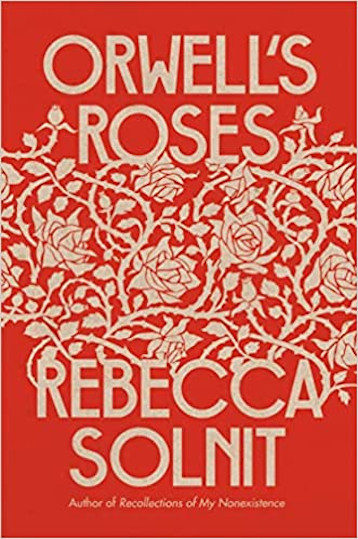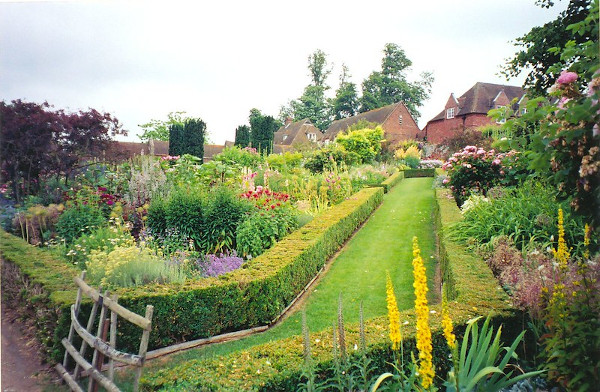Paying Homage to a Literary Master and His Garden in ‘Orwell’s Roses’

‘Orwell’s Roses’
By Rebecca Solnit
Granta Books
308 pages
On October 11, 1939, the most influential political writer of the 20th century wrote in his diary about recent adventures in gardening: “Very fine, sunny, still weather. Dug the first trench of the new patch, planted shallots … transplanted 3 rambler rose cuttings, 1 albertine, 1 of the yellowy-white kind, the other I don’t know what kind.”
George Orwell, the world-famous nom de plume of the British writer Eric Blair, led a complicated and eventful life. Born in Burma in 1903, he was educated in England, and later returned to Burma as a member of the Indian Imperial Police. In 1927, he began a five-year stint exploring poverty and the life of vagrants, later captured in his classic work, Down and Out in Paris and London.
In the Spanish Civil War, Orwell fought against the dictator Franco’s forces until he was shot in the throat and went on to recover in England and Morocco. He worked for the BBC during the Second World War, and after the death of his first wife, relocated to Jura, a desolate island off the coast of Scotland. He lived and worked there until his death from tuberculosis in 1950, at the age of 46.
Orwell wrote not one, but two century-defining works, Animal Farm and Nineteen Eighty-Four—novels that speak directly to readers today, more than 50 years later. He dedicated his life to writing about and warning of the dangers of totalitarian politics and, most presciently, the breakdown of language when it comes to previously clear distinctions between truth and falsehood.

The life story of this brilliant writer underpins the free-flowing structure of Rebecca Solnit’s new book, Orwell’s Roses. Departing from the structure of more traditional biographies, Solnit draws interesting connections between the acts of writing and gardening (Orwell was a fanatic about his gardening activities):
“What is vivid in the writing is not how it hits the senses but what it does in the imagination; you can describe a battlefield, a birth, a muddy road, or a smell—Orwell would become famous for all the stenches in his books—but it is still black letters on a white page, with no real blood or mud or boiled cabbage.”
Gardening, on the other hand, “offers the opposite of the disembodied uncertainties of writing. It’s vivid to all the senses, it’s a space of bodily labor, of getting dirty in the best and most literal way, an opportunity to see immediate and unarguable effect.”
From there, Solnit undertakes a lengthy and circuitous route to telling Orwell’s story. In her wide-ranging approach, many other topics come under review—from the state of English gardens in the 18th century to the ravages of land and people under Stalin’s rule and dire working conditions in an industrial rose farm in Bogotá, Colombia.

Yet, she returns time and again to the mystery and allure of roses:
“The petals of this domesticated flower are fleshy without being thick or tough like a magnolia petal, delicate without being as frail as one of the wildflowers that wilts as soon as you pick it, and this quality that resembles human skin lasts as they lose their crispness and sag, as though gravity first arrived in middle age, before their smoothness erodes into tiny wrinkles that fracture the smooth surface as the flower begins to wither in earnest.”
In this way, roses “represent the fleeting, evanescent nature of life … with the implication that that which does not last is more precious for it.”
This insightful comparison of a delicate flower and human skin is just one example of why we seek out writers like Solnit, who are so adept at devising fresh ways of looking at commonplace things.

On paper, Orwell’s Roses has everything going for it—intriguing subject matter, a talented writer’s masterly flourishes—but on some level, the book often stubbornly fails to engage the reader. It might be the diffuse range of Solnit’s expertise and knowledge, or the self-consciously rambling nature of the work, but it was possible to put the book down for long stretches before returning to it.
Still, Solnit reminds us of the value of rereading classics like Nineteen Eighty-Four: “Reading a significant book is like revisiting an old friend: you find out how you’ve changed when you encounter them again; you see differently because you’re different.”
The work of George Orwell exemplifies the wisdom of this statement.
Author Bio:
The Confessions of Gabriel Ash, a new novel from Lee Polevoi, Highbrow Magazine’s chief book critic, will be published in 2023.
For Highbrow Magazine
Image Sources:
--Granta Books
--Marian Sicko (Pexels, Creative Commons)
--Guldfisken (Flickr, Creative Commons)
--Cassowary Colorizations (Wikimedia.org, Creative Commons)































































































































































































































































































































